Almost five years ago (!), I wrote a beginner’s guide to K.J. Parker for this very site. “Starting with first principles” is still up, and, although 2015 feels like a distant and more innocent time, I’m still standing by every word.
Unlike 2015, however, I can’t pretend that Parker is ‘merely’ a cult author. Parker’s production of short stories, novellas, collections and novels has been matched only by his critical acclaim. Suffice to say that Parker’s brilliance is no longer a secret. But even if Parker hipsterism (Holtsterism) is passé, the author’s quality remains undiminished. The recent albums are just as good as the first one. But Parker’s prodigious output makes the dilemma of choosing one’s first Parker all the more difficult. So where to begin? Parker’s works cunningly defy any sort of simple classification—if I were the sort to ascribe authorial intent, I would shake my fist and declare the author was being deliberately difficult. But there are some themes and trends, or, perhaps better put: axes.
Magic vs the Mundane
For one, how much magic do you like in your fantasy? Parker’s novels, for example, have always had a standoffish relationship with the overtly supernatural. They, mostly, take place in secondary worlds, often with a Roman or Byzantine inflection. But they are also devoid of dragons and spell-slingers. By contrast, Parker’s shorter fiction often directly explores the arcane: featuring wizards and demons and more.
Magic optional
ISFDB classifies Parker’s latest novel, Sixteen Ways to Defend a Walled City, as ‘non-genre’, so that’s a sensible place to start if you don’t need dragons in your drama. Things look bleak when Orhan, a back office sort of military man, winds up running the show during the Great Siege. He’s isolated, he’s broke, and his ‘army’ is ill-equipped and thoroughly outnumbered. Fortunately, he’s made a career out of being an underdog. He’s clever, ambitious and utterly unscrupulous. After a few pages with Orhan, you start feeling sorry for the invading army…
Buy the Book
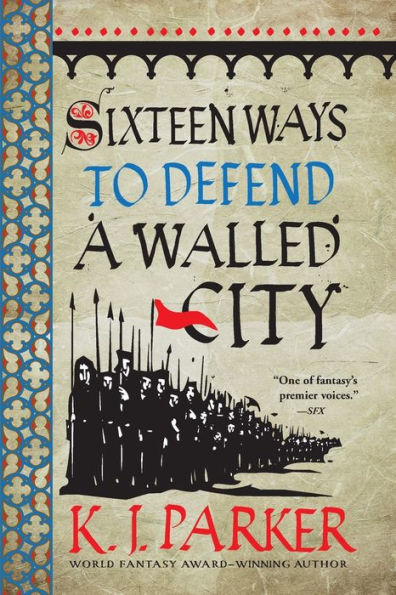

Sixteen Ways to Defend a Walled City
MOAR FIREBALLS
Academic Exercises and Father of Lies are two of Parker’s collections and are, cover to cover, packed with some of the most clever, twisty, twisted fantasy stories that you’ll ever encounter. They’re perfect for readers that love magic, and want to see it used properly: magic as the provenance of curious people, who want to tinker and play. Magic, not as a system of rules, but as an excuse to bend them. “Amor Vincit Omnia” and “Message in a Bottle”, for example, are sneaky little stories with the cleverness of Golden Age mysteries, but the imagination of the best modern fantasy.
Buy the Book
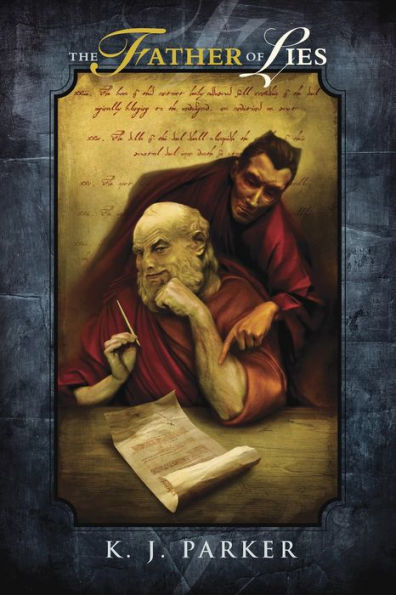

Father of Lies
Brawn vs Brains
Or another dimension—we’ve touched on sorcery, but how about swords? The might to go with the magic. Or do you prefer your conflict a little more low key?
Hack and slash, bro
Sharps is, as the name indicates, all about pointy things. A novel about espionage and imperial ambitions, featuring a travelling team of fencers. The swordplay is front and centre, with all the hackery and slashery that you can ever hope for. Parker being Parker though, the swordplay is treated clinically. It is never described with the florid, quasi-poetic prose of traditional high fantasy. It is mechanical and scientific; impressive and respected, but always taken seriously.
The Scavenger trilogy has sword-monks, I mean, what else do you need? On paper, it feels a bit like a video game: a protagonist with no memory, who is possibly—probably?—a living God, and most definitely dangerous. He wanders the world trying to put together pieces of his past, and increasingly, as he gets clued in: trying to hide from it. Whoever he was—whoever he still is—our nameless, pastless protagonist is trouble; violence and catastrophe follow him wherever he goes. Despite our hero’s best efforts, this is a bloody and terrible book, full of mayhem, swordplay and apocalyptic tragedy.
Buy the Book
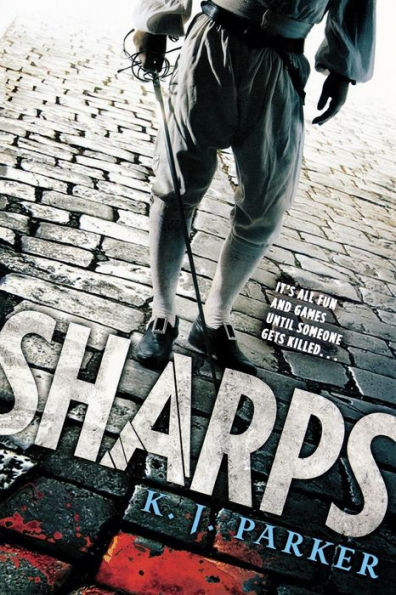

Sharps
Talk it out.
I recommend The Folding Knife constantly, if not continuously. And there’s a lot to recommend: it is a political thriller in a secondary world, with some of the most spectacular and surprising plot twists. First and foremost though, The Folding Knife is about Basso—its ambitious and flawed protagonist. Basso is not a warrior, nor heir to a secret bloodline. He’s not in possession of singular magic. Basso achieves greatness through hard work, charisma, intelligence and willpower. No swordplay—although the titular blade does some bloody work—Basso fights different sort of battles.
For more on The Folding Knife, check out Tor.com’s ridiculously superb reread.
Buy the Book
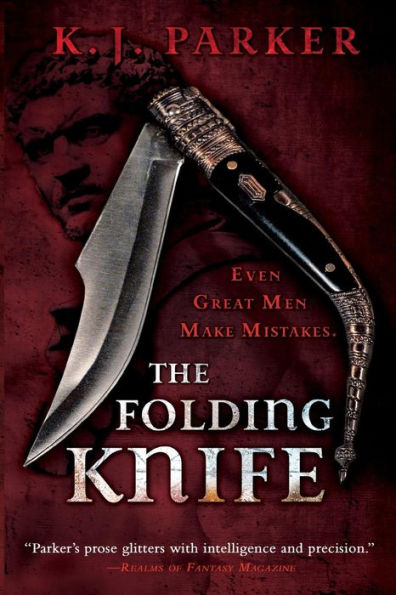

The Folding Knife
Epic vs Intimate
Or do you choose a book based on scale? Do you want to read about the fate of nations? Or something a little more personal?
EMBIGGEN ME
The Two of Swords is a lengthy, serialised novel that was ultimately collected in three volumes. Each novella-length portion is told from a different perspective, capturing everything from peasants to conspirators to assassins to politicians. Two great nations are at war, and the conflict spirals to include an ages-old, mysterious religious order, ambitious, external imperials powers, and much, much more. The constant perspective shifts reveal higher and higher stakes, but also keep the reader grounded in the personal costs of the war.
Buy the Book
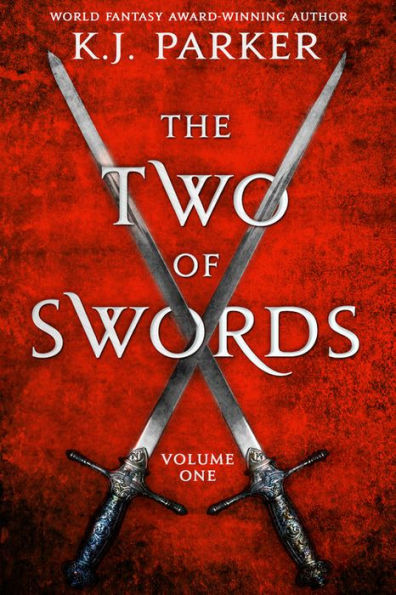

The Two of Swords: Volume One
Keep it cuddly.
“A Small Price to Pay for Birdsong” is Amadeus in a fantasy setting; a rivalry between a music teacher and his genius student. Although it encapsulates powerful themes of ambition and authorship, ownership and betrayal, “Birdsong” is ultimately a tightly-focused story about one man and his relationship with art.
Heroes vs Anti-heroes
Do you prefer fantasies where Good triumphs and Evil loses? Or something a little more ambiguous? Goodies or baddies or something a little more rogueish?
Bring on the good guys!
The new novella, Prosper’s Demon, has a clear division between good and evil. And, in case of confusion, the latter are demons. Our protagonist has a rare gift of exorcism, the ability to perceive—and battle with—the demons. But with that gift comes a heavy moral weight: the demons don’t leave easily, and the cost can be significant. The world and its magic are fascinating, but the best part of the story is the co-dependency between the exorcist and the demon; the good and the evil. Spoiler: the good guys win. But, further spoiler: do they?
Buy the Book
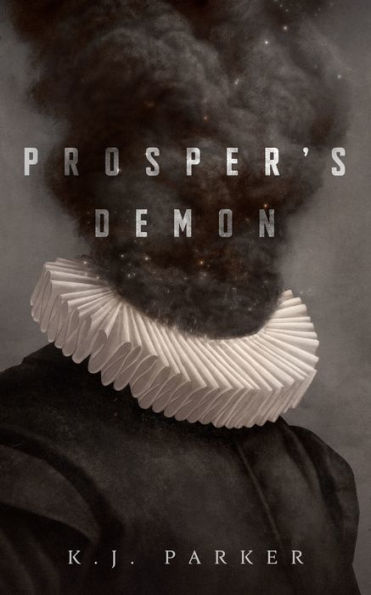

Prosper's Demon
… Eh. Heroism is overrated.
Blue and Gold is another novella, but there’s no clear cut good and evil here. In fact, the reader immediately faces the sinking suspicion that the protagonist might be on the wrong side of any sort of moral division. Salonius is an undisputed genius—the finest alchemist in history. He’s also a shameless liar. He’s held captive, forced to use his genius for a greedy patron, but he’s also no angel. He’s hard-used, but no hero.
Buy the Book
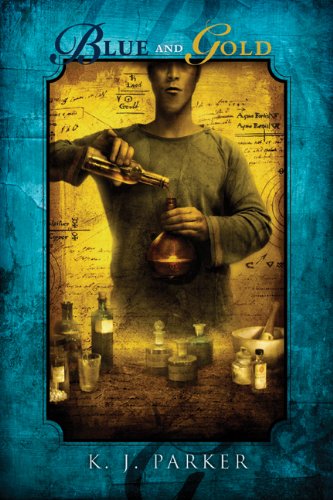

Blue and Gold
This is only a small selection of Parker’s work, and only a few of the possible entry points. In a heroic sacrifice of my own, I’ve left off the Engineer and Fencer trilogies, The Hammer, The Company, and all of the many, many other works that are also my favourites. We’re fortunate enough to have a lot of Parker to choose from, and I hope this helps you find the right first one for you.
Jared Shurin is the editor of The Djinn Falls in Love, The Outcast Hours, The Best of British Fantasy, and many other published and/or forthcoming works. He writes irregularly at raptorvelocity.com and continuously at @straycarnivore.










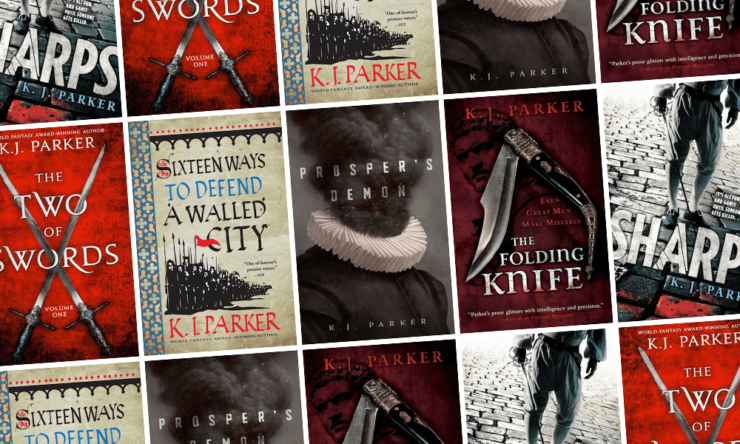
Parker is one of the few fantasy writers I can read. He avoids being generic. Thank god no dragons or bards.
I got started on KJ Parker with his novella The Last Witness. I think it’s a pretty good place to start – it’s short, a standalone, and just really excellent writing.
In both the Engineer trilogy and the Swords trilogy, we have a protagonist (one of several viewpoint characters in both, as I recall) who upends kingdoms, leading to death and destruction over huge areas, for love of a woman. Who, in both cases, as I recall, doesn’t care for him very much and didn’t really want him back, or to be returned to him.
Worth noting, at least in the case of the Engineer trilogy (but evident elsewhere) is Holt’s deep knowledge of pre-steam technology – just what it could do and what its practitioners could do with it. However, he brings in a modern understanding of such things as standardization of parts and of weights and measures that I don’t think any pre-industrial culture really reached. Horologists, maybe.
@3: Probably spoilers there… But I absolutely love (esp in Engineer) the ambiguity of the central ‘romance’. And the resolution being quite emotionally uncertain. Which is wonderful.
Although nothing will compare to the ending of the Scavenger trilogy, which, to me, is perfect.
@@.-@ Jared_Shurin –
Ah, you’re right, wasn’t thinking. Hope that I didn’t ruin the read for anyone. At least for the Swords trilogy, the relationship (or at least that particular relationship) is only one thread in the novel as a whole, so there’s plenty left over for the new reader.
I haven’t been able to find the Scavenger Trilogy – Parker is only irregularly available in my area. The retail book market is dominated by a single chain, and if they don’t get it, we don’t either.
@5: Raskos… Oh man, that’s rough. It took me forever to assemble Scavenger myself, as it (like Fencer) sort of dates from the before-breakout days, and I was in the US at the time which really didn’t care about KJP at ALL then. I think eBay finally solved it for me. It is well worth it though, if you can.
I oscillate between Scavenger and Engineer as the ‘best’ KJP. Scavenger seems much more chaotic and organic, but, under the surface might be even more finely, er, engineered. But they’re both simply phenomenal.
@6 Jared_Shurin –
thanks for the recommendation. Christmas is coming up, and I usually spend a bit of money on myself at this time of year. Guess that some of it will be on Parker novels, those Scavenger ones in particular. I already have a full set of Engineers and I think you’re right in the adjective you apply to that trilogy.
I need to continue with my Parker reading — I left off with The Company.
I did like his initial trilogies (Fencer, Scavenger, Engineer) but I’m glad he move on to single novels — makes it easier to just slot one in here or there.
Somewhere I think there’s an interesting essay to be written comparing Parker to, say, Neal Stephenson’s Baroque Cycle, especially in terms of their asides about technology &c.